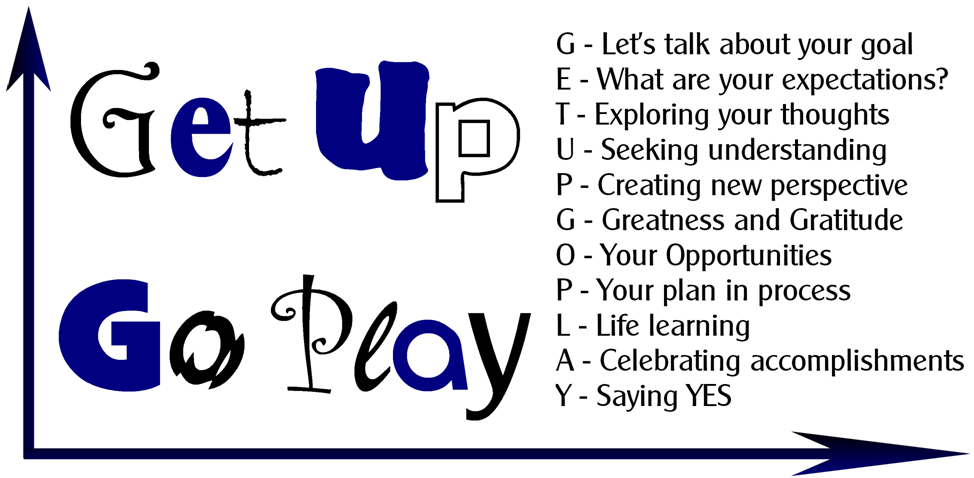A Coaching Model Created by Sarah Mills
(Health, Wellness and Fitness Coach, SOUTH AFRICA )
 GET UP GO PLAY Model Breakdown
GET UP GO PLAY Model Breakdown
GET:
What do you want?
G – Identify your goal
E – Align your expectations to the coaching process
T – Begin exploring your thoughts
UP:
Why do you want it?
U – Shape your understanding of your situation
P – Begin the process of gaining perspective
GO:
How are you getting it?
G – Build up your greatness with gratitude
O – Open yourself to opportunity
PLAY:
What is your reward?
P – Maintain your plan in process
L – A lifetime of learning
A – Reward you accomplishments
Y – Saying YES to challenges
Description
The GET UP GO PLAY © coaching model is based on the positive projection concept of motivation. The idea is to set the client up within a proactive plan of action by immediately engaging their mind in the middle of the process. The initial goal-setting stage of the model is short and intensive, and is quickly followed by an exploratory reflection on where the client is at. Next, the client is walked through a developmental process which outlines the client’s goal in context, then creates a framework for how the client can move forward in a way suitable for them. The remainder of the model works mainly in a facilitory manner, tracking the pace, positivity and commitment of the client.
Unique Features
Positive Projection
The positive projection concept of motivation mentioned in the description is, practically speaking, the vision that someone aims for when they set out to achieve something. The positive projection vision is specifically projecting a positive situation into the future. Although outcomes cannot be predicted, the client can focus on transforming any negativity into positive growth. In this way the client can stay motivated even when feeling adversity.
The Middle of the Process
Throwing the client right into the action is a key point to this coaching model. By incorporating key words into your questions, your client’s perspective will begin to shift into a progressive state.
For example:

Exploratory Reflection
In order for the client to move forward, we need to establish where the client is now. During this reflection, the client’s perception, beliefs, priorities, strengths and motivation are uncovered. These will form the base from which the client can progress forward. Various other influential factors are also uncovered, which play a role in the client’s decision-making and logical assumptions.
Creating Context and Framework
The context of a goal is important for mediating the client’s perspective. Checking in with the larger context and reasons behind why clients want to achieve these goals allows clients to maintain the direction they need, as well as to manage any changes which occur. This becomes important when their values and priorities change, and they find they need to manage immediate situations while still considering their overall progress without losing focus.
The framework or outline of their development process functions as a marker for milestones, rewards and points to challenge. Within this, it is important for the client to define the pace at which they’d like to develop. The coach needs to ensure that this pace is maintained and adjusted according to particular situations.
Saying YES to challenges
This concept is all about seeing the lesson in the challenges presented to us. This means that all perceived negativity, failures, inconveniences and anything else we generally don’t find comfortable is actually an instance of a lesson being learnt. The purpose of this is to implement a method of turning negativity into positivity, or to at least neutralize any negativity to the point where calm can be introduced.
